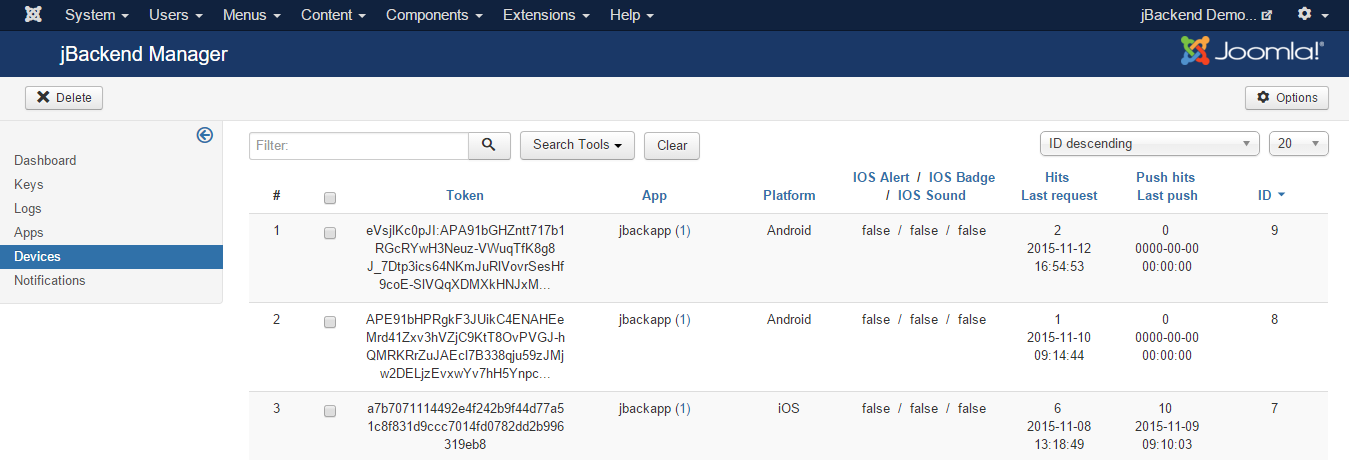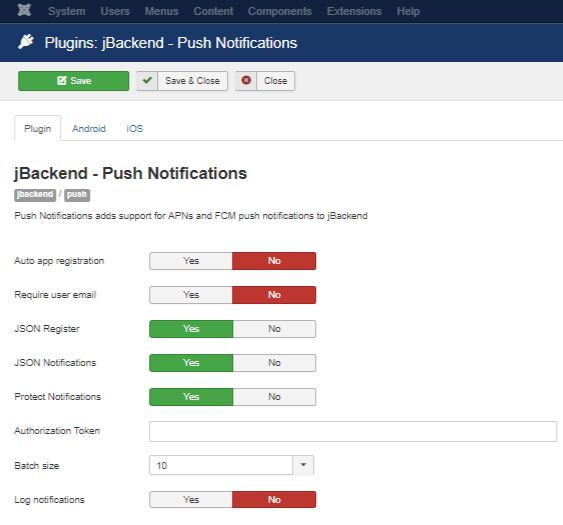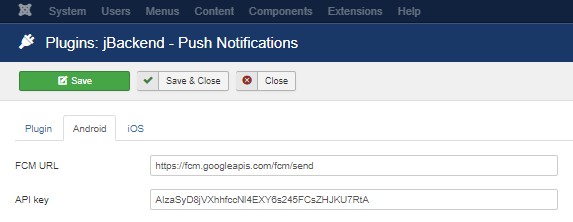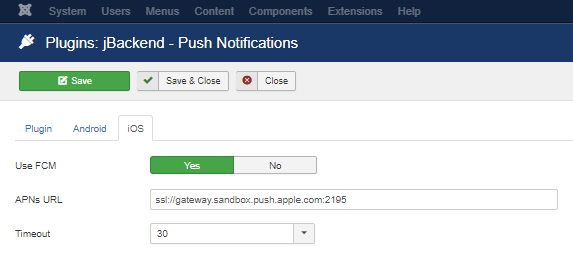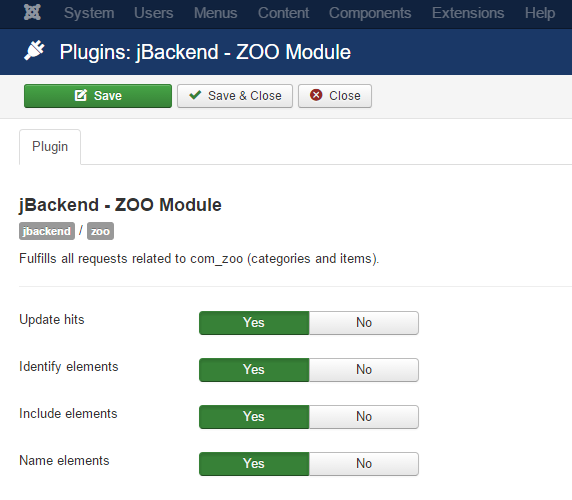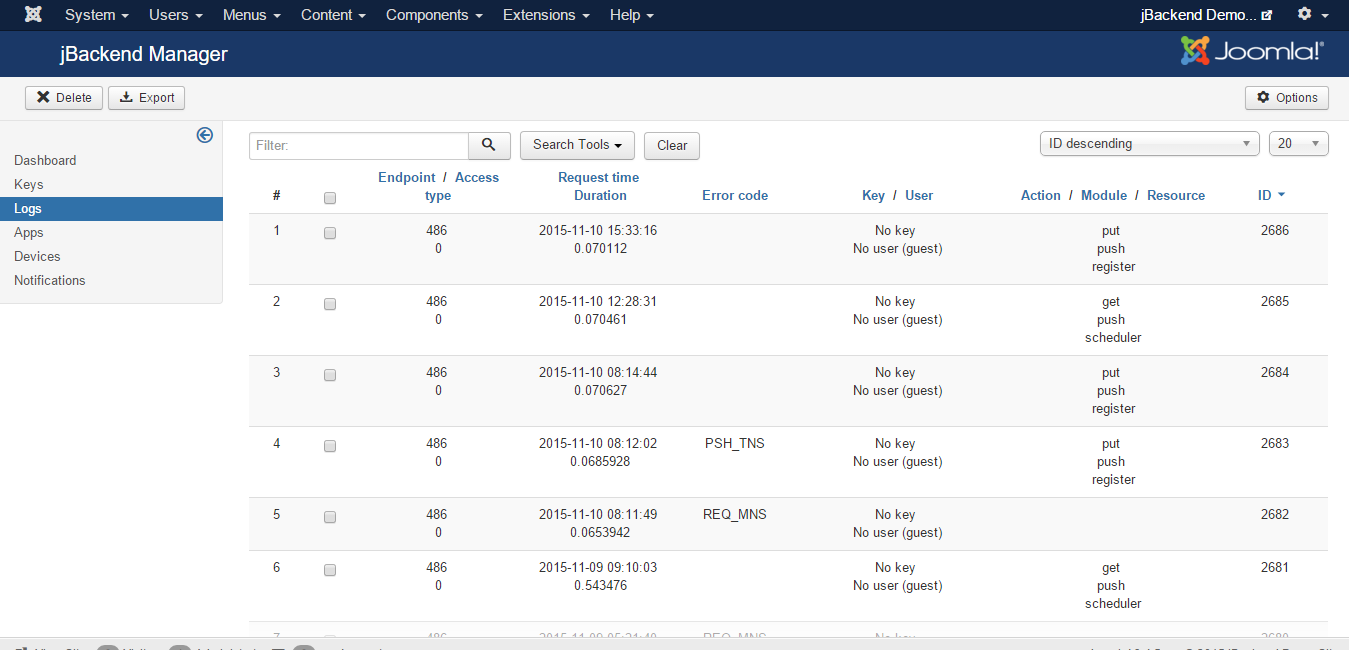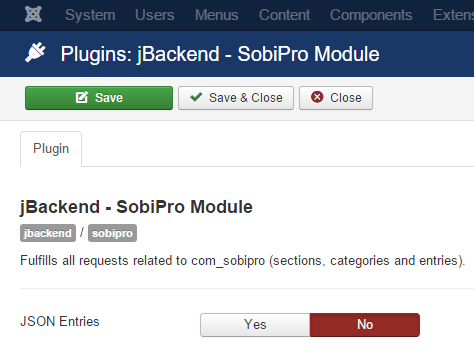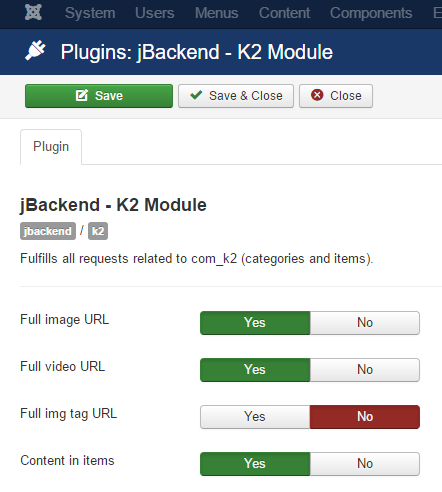Displaying items by tag: jbackend
Devices
To access to the list of registered devices go to menu Components > jBackend > Devices. A list of mobile devices will be shown:
It is not possible to add or edit device manually. Device registration is performed through a request to the Push Module.
Each registered device has the following information:
| Field: | Description: |
|---|---|
| Token | Device Token |
| App | App code |
| Platform | OS platform |
| IOS Alert | App setting desired about alert on iOS (an optional registration param for the app) |
| IOS Badge | App setting desired about badge on iOS (an optional registration param for the app) |
| IOS Sound | App setting desired about sound on iOS (an optional registration param for the app) |
In the current version alert, badge and sound fields are not used yet. They will be used in future, as example, to filter target devices for push notification sending.
For each device the following statistics fields are available:
| Field: | Description: |
|---|---|
| Hits | Number of times the device has registered |
| Last visit | Last time the device has registered |
| Push hits | Number of push notifications sent to device |
| Last push | Last time a push notification has been sent to device |
Apps
To access to configured apps go to menu Components > jBackend > Apps. A list of mobile apps will be shown:
Each registered app has the following information:
| Field: | Description: |
|---|---|
| Code | The application unique code (it will be converted in lowercase) |
| Description | An arbitrary description for the application |
| Project ID | Google Project ID |
| Project number | Google Project number (it will be used as Sender ID) |
| API key | Google API key |
| SSL certificate | Apple SSL certificate |
| Password | Password for Apple SSL certificate |
SSL Certificate
The SSL certificate for APNs must be in PEM format, and must include the certificate and the private key. If the private key is not protected by password, the password field must be empty.
Here is an example of the PEM certificate:
-----BEGIN CERTIFICATE----- MIIFjDCCBHSgAwIBAgIIAYymZoETLVYwDQYJKoZIhvcNAQEFBQAwgZYxCzAJBgNV BAYTAlVTMRMwEQYDVQQKDApBcHBsZSBJbmMuMSwwKgYDVQQLDCNBcHBsZSBXb3Js ZHdpZGUgRGV2ZWxvcGVyIFJlbGF0aW9uczFEMEIGA1UEAww7QXBwbGUgV29ybGR3 aWRlIERldmVsb3BlciBSZWxhdGlvbnMgQ2VydGlmaWNhdGlvbiBBdXRob3JpdHkw ... Nw2VqrNGWt42Jwt66015Ww+Toh5KaTisMJnR/UQsDOWErVUkmZBbrVkbIy/hhTYZ b/MJRYBvnAQEtNU08eac3aqOEUFBt/Uu/HUigfvkxXOUdwMW4+wEB3uR2cLghrcA XvVMho17NIY9rXy3bEIuzwDTUFoCOfBEBYqW00BJVTGkOa6EWDI7SZbuULtxlByD 4edJl4ukCdZrJaTfHWMPeGqnv+MIrxz6LNSeiulTyQw= -----END CERTIFICATE----- -----BEGIN RSA PRIVATE KEY----- Proc-Type: 4,ENCRYPTED DEK-Info: DES-EDE3-CBC,D20C57B1444E286C uWXgF5I7fBBv2vY4N0yXiF9Uar+BRilhLUEuAcwDJJhWCFvnxVuBerck68Z5Zcbf JNJlESBp7exD5sTgNfok12bRw9cXvhMibY70riCukfhJveSWXCYIgN9BYtUjZgdn u8FZLtuRQH+HqY9OEjfQ9bcAiRX2a4uL1rKGCnyZShyWMRAtjLrOvT6Lzm8D59l6 7u8JcGlRAw+bdpDntwmB+17ep0zYd19uNRR5x9YKQfn9b55z1FiS+cBvwqqxnEtK ... jNqc19lOabQjkmCPzJjUVeaR/7pco2pGhNoA9UpK9kgL82yuj4Vo/+VYbSw1a+/d NkNKwOQTLttvKihEWDIZchoNP4vB/QnBo1DOAf+LRhtS3ja/FnLvsIouVeHo4OTL NqJKpw2FLJUY2cxxfu0rVID6motRsSwR4vZ3RYoFf7lA9nQpWtaCDgxoohuFF4Jp q+j5ZfY1MI0zQV56BnowR/0ocgzoibd6x3hTl076MGikjI6++Go6ng== -----END RSA PRIVATE KEY-----
Push Module API
The Push Module is implemented with the plg_jbackend_push plugin. It provides functions related to mobile push notifications for iOS and Android. Here is the list of supported methods.
Register
The register function must be called by mobile apps each time they get a notification token from the push service (e.g. APNs or FCM) to register the device on jBackend. Registration is needed to send push notifications to the app on the registered device.
Request parameters
action=put module=push resource=register token=<token> appcode=<appcode> platform=<platform> user_id=<user_id> (optional) user_email=<user_email> (optional) ios_alert=<true or 1> (optional) ios_badge=<true or 1> (optional) ios_sound=<true or 1> (optional)
Example
<end-point>?action=put&module=push&resource=register&token=<token>&appcode=<appcode>&platform=ios
Example (REST format)
<end-point>/put/push/register?token=<token>&appcode=<appcode>&platform=android
Response
{
"status": "ok",
"token": "<token>",
"appcode": "<appcode>",
"platform": "<generic|android|ios>",
"platform_code": <platform_code>,
"app_id": "<app_id>",
"device_id": <device_id>,
"ios_alert": <0|1>,
"ios_badge": <0|1>,
"ios_sound": <0|1>
}
Notes
Supported platform codes are 0=Generic, 1=Android, 2=iOS.
It is possible to associate an existing Joomla user to the device with the user_id param. If the plugin option Require user email is enabled, it is also needed to include the user_email field, and the email must match with the registered email address for the user with the specified user_id.
On iOS platform the app can also send (optionally) its notification settings for alert (ios_alert), badge (ios_badge), and sound (ios_sound). These values can be used to filter target devices when sending push notifications from jBackend.
Scheduler
The scheduler function must be called on a regular basis (e.g. from a crontab) to trigger the sending of scheduled push notifications.
Request parameters
action=get module=push resource=scheduler
Example
<end-point>?action=get&module=push&resource=scheduler
Example (REST format)
<end-point>/get/push/scheduler
Response
{
"status": "ok",
"batch_size": <N>,
"sent": <T>,
"success": <S>,
"failure": <F>
}
Notes
Sent is the total number of processed notifications.
Notifications
This function allows to create a push notification programmatically (i.e. add a notification to the queue).
Request parameters
action=post module=push resource=notifications title=<title> message=<message> app_code=<app_code> platform=<platform> target=<target> target_users=<target_users> target_groups=<target_groups> target_devices=<target_devices> scheduled_time=<scheduled_time> payload=<payload> (optional) context=<context> (optional) auth_token=<auth_token> (optional)
Example
<end-point>?action=post&module=push&resource=notifications&title=<title>&message=<message>&app_code=<code>&platform=1&target=0&scheduled_time=2016-11-13%2000:15:31
Example (REST format)
<end-point>/post/push/notifications?title=<title>&message=<message>&app_code=<code>&platform=1&target=0&scheduled_time=2016-11-13%2000:15:31
Response
{
"status": "ok"
}
Notes
Supported platform codes are 0=Generic, 1=Android, 2=iOS.
Supported target codes are 0=All, 1=Selected users, 2=Selected groups, 3=Selected devices.
Params target_users, target_groups and target_devices are comma separated list of id.
Scheduled time format is YYYY-MM-DD HH:MM:SS (e.g. 2016-07-23 00:19:11).
Params payload and context can be a string or a json.
Plugin Settings
The following options are available for push plugin:
| Option | Description |
| Auto app registration | Allow automatic creation of new applications by code. |
| Require user email | Require the user email to add the user id when register a device (as a security measure). |
| JSON Register | Enable JSON payload on register action. |
| JSON Notifications | Enable JSON payload on add notification action. |
| Protect Notifications | Enable token protection on add notification action. |
| Authorization Token | The token that enables the add notification action. |
| Batch size | Number of push messages to send out each batch job. |
| Log notifications | Enable logging of all notifications in a dedicated database table (useful for analytics purposes). |
| FCM URL | URL of Firebase Cloud Messaging server. |
| API key | Google API key. |
| Use FCM | Use FCM to send push messages on iOS too. |
| APNs URL | URL of Apple APNs server. |
| Timeout | APNs connection timeout. |
Menu Module API
The Menu Module is implemented with the plg_jbackend_menu plugin. It provides functions related to Joomla menus (com_menus). Here is the list of supported methods.
Get the list of menus
Request parameters
action=get module=menu resource=menus limit=<L> (optional) offset=<O> (optional) orderby=<field> (optional) orderdir=<dir> (optional)
Example
<end-point>?action=get&module=menu&resource=menus&limit=<L>&offset=<O>
Example (REST format)
<end-point>/get/menu/menus?limit=<L>
Response
{
"status": "ok",
"total": <total items>,
"limit": <pagination limit>,
"offset": <pagination offset>,
"pages_current": <current page>,
"pages_total": <total pages>,
"menus": [
{
"id": "<menu id>",
"menutype": "<menu type>",
"title": "<menu title>",
"description": "<menu description>",
"count_published": "<total published>",
"count_unpublished": "<total unpublished>",
"count_trashed": "<total trashed>"
},
...
{
"id": "<menu id>",
"menutype": "<menu type>",
"title": "<menu title>",
"description": "<menu description>",
"count_published": "<total published>",
"count_unpublished": "<total unpublished>",
"count_trashed": "<total trashed>"
}
]
}
Get a menu
Request parameters
action=get module=menu resource=menus id=<N>
Example
<end-point>?action=get&module=menu&resource=menus&id=<N>
Example (REST format)
<end-point>/get/menu/menus/<N>
Response
{
"status": "ok",
"id": "<menu id>",
"menutype": "<menu type>",
"title": "<menu title>",
"description": "<menu description>"
}
Get the list of menu items
Request parameters
action=get module=menu resource=items menutype=<menutype> parentid=<R> (optional) level=<E> (optional) limit=<L> (optional) offset=<O> (optional) orderby=<field> (optional) orderdir=<dir> (optional)
Example
<end-point>?action=get&module=menu&resource=items&menutype=<menutype>&orderby=<field>&orderby=<dir>
Example (REST format)
<end-point>/get/menu/items?menutype=<menutype>
Response
{
"status": "ok",
"total": <total items>,
"limit": <pagination limit>,
"offset": <pagination offset>,
"pages_current": <current page>,
"pages_total": <total pages>,
items: [
{
"id": "<article id>",
"menutype": "<menu type>",
"title": "<title>",
"alias": "<alias>",
"note": "<note>",
"path": "<path>",
"link": "<link>",
"type": "<type>",
"parent_id": "<parent id>",
"level": "<level>",
"component_id": "<component id>",
"browserNav": "<browserNav>",
"access": "<access>",
"img": "<img>",
"template_style_id": "<template style id>",
"home": "<home>",
"language": "<language>",
"client_id": "<client id>",
"language_title": "<language title>",
"image": "<image>",
"componentname": "<component name>",
"access_level": "<access level>",
"name": "<component name>"
},
...
{
...
}
]
} jBackend Custom Modules
If you need to integrate your Joomla site with another system or offer a service through a set of accessible API, jBackend is the right extension for you. jBackend can be extended with custom plugins to support any kind of extension and provide any kind of service. There is a detailed documentation which explains how to create your own modules. And if you are not a programmer you can HIRE US and get the job done right.
Reasons for success with us:
- We have a long experience as system integrator;
- We are a Joomla experts with a great reputation from the community;
- We are cheap... really, prices from 20 euro;
- And moreover, we are the creators of jBackend, so we know what we do.
How to get in touch with us:
To request a quote without engagement, This email address is being protected from spambots. You need JavaScript enabled to view it. or compile a request form, or access to Client Manager and create a new project request.
ZOO Module API
The ZOO Module is implemented with the plg_jbackend_zoo plugin. It provides functions related to ZOO extension (applications, categories and items). Here is the list of supported methods.
Get the list of categories
Request parameters
action=get module=zoo resource=categories app=<app id>
Example
<end-point>?action=get&module=zoo&resource=categories&app=<A>
Example (REST format)
<end-point>/get/zoo/categories?app=<A>
Response
{
"status": "ok",
"total": <T>,
"categories": [
{
"id": "<category id>",
"name": "<category name>",
"alias": "<category alias>",
"description": "<description>",
"parent": "<parent id>"
},
...
{
"id": "<category id>",
"name": "<category name>",
"alias": "<category alias>",
"description": "<description>",
"parent": "<parent id>"
}
]}
Get a category
Request parameters
action=get module=zoo resource=categories id=<N> app=<app id>
Example
<end-point>?action=get&module=zoo&resource=categories&id=<N>&app=<A>
Example (REST format)
<end-point>/get/zoo/categories/<N>?app=<A>
Response
{
"status": "ok",
"id": "<category id>",
"name": "<category name>",
"alias": "<category alias>",
"description": "<category description>",
"application_id": "<application id>",
"parent": "<parent id>",
"ordering": "<ordering>",
"content_subtitle": "<content subtitle>",
"content_image": "<content image>",
"content_image_width": "<content image width>",
"content_image_height": "<content image height>",
"metadata_title": "<meta title>",
"metadata_description": "<meta description>",
"metadata_keywords": "<meta keywords>",
"metadata_robots": "<meta robots>",
"metadata_author": "<meta author>"
}
Get the list of items
Request parameters
action=get module=zoo resource=items category=<C> limit=<L> (optional) page=<P> (optional) app=<app id>
Example
<end-point>?action=get&module=zoo&resource=items&category=<C>&app=<A>
Example (REST format)
<end-point>/get/zoo/items?category=<C>&app=<A>
Response
{
"status": "ok",
"total": <T>,
"limit": <L>,
"page": <P>,
"items": [
{
"id": "<item id>",
"name": "<item name>",
"alias": "<item alias>",
"created": "<created date>",
"created_by": "<created by id>",
"modified": "<modified date>",
"modified_by": "<modified by id>",
"publish_up": "<publish up date>",
"publish_down": "<publish down date>"
},
...
{
"id": "<item id>",
"name": "<item name>",
"alias": "<item alias>",
"created": "<created date>",
"created_by": "<created by id>",
"modified": "<modified date>",
"modified_by": "<modified by id>",
"publish_up": "<publish up date>",
"publish_down": "<publish down date>"
}
]
}
Notes
Created and modified date format is YYYY-MM-DD HH:MM:SS
Get an item
Request parameters
action=get module=zoo resource=items id=<N> app=<app id>
Example
<end-point>?action=get&module=zoo&resource=items&id=<N>&app=<A>
Example (REST format)
<end-point>/get/zoo/items/<N>=?app=<A>
Response
{
"status": "ok",
"id": "<item id>",
"name": "<item name>",
"alias": "<item alias>",
"application_id": "<application id>",
"type": "<item type>",
"created": "<created date>",
"created_by": "<created by id>",
"modified": "<modified date>",
"modified_by": "<modified by id>",
"publish_up": "<publish up date>",
"publish_down": "<publish down date>",
"priority": "<item priority>",
"state": "<item state>",
"searchable": "<is searchable>",
"access": "<item access>",
"hits": <item hits>,
"metadata_title": "<meta title>",
"metadata_description": "<meta description>",
"metadata_keywords": "<meta keywords>",
"metadata_robots": "<meta robots>",
"metadata_author": "<meta author>",
"enable_comments": "<enable comments>",
"primary_category": "<primary category id>",
"elements": {
"<element 1 id>": {
"identifier": "<element 1 id>",
"type": "<element type>",
"data": {
"<field 1 name>": "<field 1 value>",
...
"<field M name>": "<field M value>"
}
},
...
"<element N id>": {
"identifier": "<element N id>",
"type": "<element type>",
"data": {
"<field 1 name>": "<field 1 value>",
...
"<field L name>": "<field L value>"
}
},
}
}
Notes
Created and modified date format is YYYY-MM-DD HH:MM:SS
When option Identify elements is set to No, the elements structure is different:
"elements": [
{
"identifier": "<element 1 id>",
"type": "image",
"data": {
"<field 1 name>": "<field 1 value>",
...
"<field M name>": "<field M value>"
}
},
{
"identifier": "<element N id>",
"type": "textarea",
"data": {
"<field 1 name>": "<field 1 value>",
...
"<field L name>": "<field L value>"
}
}
]
Plugin Settings
The following options are available for user plugin:
| Option | Description |
| Update hits | Update hits counter for each request. |
| Identify elements | Use field identifier as key to build the elements in the response. |
| Include elements | Include elements data in the list of items. |
| Name elements | Use a slug name for elements (in lowercase without blanks). |
Logs
To access to end-points access logs go to menu Components > jBackend > Logs. A list of traced requests will be shown:
Each logged request has the following information:
| Field: | Description: |
|---|---|
| Endpoint | The ID of the end-point that has received the request |
| Access type | The type of access used on the end-point (free, user, API key) |
| Request time | The date and time of the request |
| Duration | Time required to serve the request (in seconds) |
| Error code | The error code in case of request error |
| User ID | The ID of the user when available |
| Key | The API key used when available |
| Action | The action of the request |
| Module | The module of the request |
| Resource | The resource of the request |
It is possible to enable log trace for each end-point from the menu item options:
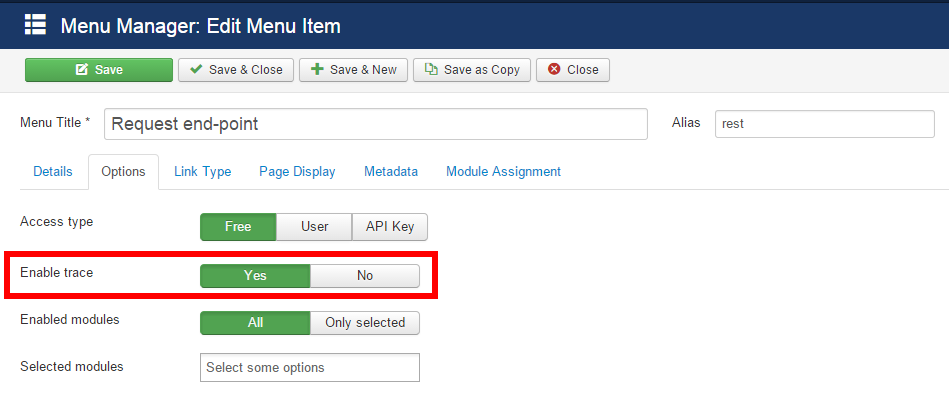
Keys
To manage API Keys used to grant access to end-points go to menu Components > jBackend > Keys. A list of jBackend Keys will be shown:
Each key has the following properties:
| Field: | Description: |
|---|---|
| Key | The enabling key |
| User | The user associated to this key (to restrict access with key and to a single user) |
| Enabled endpoints | If this key is enable on ALL endpoints or ONLY on selected endpoints |
| Selected endpoints | The endpoints for which the key is enabled, when not enabled for ALL |
| Enabled on default | If the key should also work on the default requests (i.e. /index.php?option=com_jbackend&view=request&...) |
| Daily requests | Maximum number of daily requests allowed for the key (0 means unlimited) |
| Expiration date | Key expiration date (0000-00-00 00:00:00 means never expires) |
| Comment | Just a reminder for the key |
For each key the following statistics fields are available:
| Field: | Description: |
|---|---|
| Hits | Number of times the key was used |
| Last visit | Last time the key was used |
| Current day | Current day for daily requests limit |
| Current hits | Hits of current day for daily requests limit |
The API key, when required by the endpoint, must be included in any request using one of the following methods:
- Adding api_key=<KEY> to the query params (for GET requests);
- Adding api_key=<KEY> to the payload (for POST requests);
- Adding api_key: <KEY> to the JSON payload (for JSON POST requests);
- Adding Authorization: api_key <KEY> to the headers (in any case).
SobiPro Module API
The SobiPro Module is implemented with the plg_jbackend_sobipro plugin. It provides functions related to SobiPro directory extension (sections, categories and entries). Here is the list of supported methods.
Get the list of sections
Request parameters
action=get module=sobipro resource=sections
Example
<end-point>?action=get&module=sobipro&resource=sections
Example (REST format)
<end-point>/get/sobipro/sections
Response
{
"status": "ok",
"total": <T>,
"sections": [
{
"id": "<section id>",
"nid": "<section nid>",
"name": "<section name>"
},
...
{
"id": "<section id>",
"nid": "<section nid>",
"name": "<section name>"
}
]}
Get a section
Request parameters
action=get module=sobipro resource=sections id=<N>
Example
<end-point>?action=get&module=sobipro&resource=sections&id=<N>
Example (REST format)
<end-point>/get/sobipro/sections/<N>
Response
{
"status": "ok",
"id": "<section id>",
"nid": "<section nid>",
"name": "<section name>",
"description": "<section description>",
"owner": "<section owner id>",
"counter": "<counter>",
"createdTime": "<created time>",
"updatedTime": "<updated time>",
"metaDesc": "<meta description>",
"metaKeys": "<meta keywords>",
"metaAuthor": "<meta author>",
"metaRobots": "<meta robots>",
"version": "<version number>"
}
Notes
Created and updated date format is YYYY-MM-DD HH:MM:SS
Get the list of categories
Request parameters
action=get module=sobipro resource=categories parent=<N>
Example
<end-point>?action=get&module=sobipro&resource=categories&parent=<N>
Example (REST format)
<end-point>/get/sobipro/categories?parent=<N>
Response
{
"status": "ok",
"total": <T>,
"categories": [
{
"id": "<category id>",
"nid": "<category nid>",
"name": "<category name>",
"owner": "<owner id>",
"counter": "<counter>",
"createdTime": "<created time>",
"updatedTime": "<updated time>",
"metaDesc": "<meta description>",
"metaKeys": "<meta keywords>",
"metaAuthor": "<meta author>",
"metaRobots": "<meta robots>",
"version": "<version number>"
},
...
{
"id": "<category id>",
"nid": "<category nid>",
"name": "<category name>",
"owner": "<owner id>",
"counter": "<counter>",
"createdTime": "<created time>",
"updatedTime": "<updated time>",
"metaDesc": "<meta description>",
"metaKeys": "<meta keywords>",
"metaAuthor": "<meta author>",
"metaRobots": "<meta robots>",
"version": "<version number>"
}
]}
Notes
Created and updated date format is YYYY-MM-DD HH:MM:SS
Get a category
Request parameters
action=get module=sobipro resource=categories id=<N>
Example
<end-point>?action=get&module=sobipro&resource=categories&id=<N>
Example (REST format)
<end-point>/get/sobipro/categories/<N>
Response
{
"status": "ok",
"id": "<category id>",
"nid": "<category nid>",
"name": "<category name>",
"description": "<category description>",
"owner": "<category owner id>",
"counter": "<counter>",
"createdTime": "<created time>",
"updatedTime": "<updated time>",
"metaDesc": "<meta description>",
"metaKeys": "<meta keywords>",
"metaAuthor": "<meta author>",
"metaRobots": "<meta robots>",
"version": "<version number>",
"parent": "<parent id>"
}
Notes
Created and updated date format is YYYY-MM-DD HH:MM:SS
Get the list of entries
Request parameters
action=get module=sobipro resource=entries category=<C>
Example
<end-point>?action=get&module=sobipro&resource=entries&category=<C>
Example (REST format)
<end-point>/get/sobipro/entries?category=<C>
Response
{
"status": "ok",
"total": <T>,
"entries": [
{
"id": "<entry id>",
"nid": "<entry nid>",
"name": "<entry name>",
"owner": "<owner id>",
"counter": "<counter>",
"createdTime": "<created time>",
"updatedTime": "<updated time>",
"metaDesc": "<meta description>",
"metaKeys": "<meta keywords>",
"metaAuthor": "<meta author>",
"metaRobots": "<meta robots>",
"version": "<version number>"
},
...
{
"id": "<entry id>",
"nid": "<entry nid>",
"name": "<entry name>",
"owner": "<owner id>",
"counter": "<counter>",
"createdTime": "<created time>",
"updatedTime": "<updated time>",
"metaDesc": "<meta description>",
"metaKeys": "<meta keywords>",
"metaAuthor": "<meta author>",
"metaRobots": "<meta robots>",
"version": "<version number>"
}
]}
Notes
Created and updated date format is YYYY-MM-DD HH:MM:SS
Get an entry
Request parameters
action=get module=sobipro resource=entries id=<N>
Example
<end-point>?action=get&module=sobipro&resource=entries&id=<N>
Example (REST format)
<end-point>/get/sobipro/entries/<N>
Response
{
"status": "ok",
"id": "<entry id>",
"nid": "<entry nid>",
"name": "<entry name>",
"owner": "<entry owner id>",
"section": "<entry section id>",
"counter": "<counter>",
"createdTime": "<created time>",
"updatedTime": "<updated time>",
"metaDesc": "<meta description>",
"metaKeys": "<meta keywords>",
"metaAuthor": "<meta author>",
"metaRobots": "<meta robots>",
"version": "<version number>",
"fields": [
{
"name": "<field name>",
"fid": "<field id>",
"nid": "<field nid>",
"sid": "<field sid>",
"section": "<section id>",
"lang": "<language code>",
"_data": "<field data>",
"_rawData": "<field raw data>",
"fieldType": "<field type>",
"isFree": "<is free>",
"position": "<position>"
},
...
{
"name": "<field name>",
"fid": "<field id>",
"nid": "<field nid>",
"sid": "<field sid>",
"section": "<section id>",
"lang": "<language code>",
"_data": "<field data>",
"_rawData": "<field raw data>",
"fieldType": "<field type>",
"isFree": "<is free>",
"position": "<position>"
}
]}
Notes
Created and updated date format is YYYY-MM-DD HH:MM:SS
Plugin Settings
The following options are available for user plugin:
| Option | Description |
| JSON Entries | Enable JSON payload on entries action. |
K2 Module API
The K2 Module is implemented with the plg_jbackend_k2 plugin. It provides functions related to K2 content construction kit for Joomla (items and categories). Here is the list of supported methods.
Get the list of categories
Request parameters
action=get module=k2 resource=categories rootid=<R> (optional) endlevel=<E> (optional)
Example
<end-point>?action=get&module=k2&resource=categories&rootid=<R>&endlevel=<E>
Example (REST format)
<end-point>/get/k2/categories?rootid=<R>
Response
{
"status": "ok",
"total": <T>,
"categories": [
{
"id": "<category id>",
"name": "<category name>",
"alias": "<category alias>",
"description": "<category description>",
"parent": "<parent category id>"
},
...
{
"id": "<category id>",
"name": "<category name>",
"alias": "<category alias>",
"description": "<category description>",
"parent": "<parent category id>"
}
]
}
Notes
If rootid is specified, starts to get subcategories from the specified category id instead of the root category. If endlevel is specified, get categories and all subcategories up to the specified number of level, otherwise get all levels (default).
Get a category
Request parameters
action=get module=k2 resource=categories id=<N>
Example
<end-point>?action=get&module=k2&resource=categories&id=<N>
Example (REST format)
<end-point>/get/k2/categories/<N>
Response
{
"status": "ok",
"id": "<category id>",
"name": "<category name>",
"alias": "<category alias>",
"description": "<category description>",
"robots": "<meta robots>",
"author": "<meta author>",
"language": "<language code>",
"parent": "<category id>"
}
Notes
Language can be "*" if any.
Get the list of items
Request parameters
action=get module=k2 resource=items cats=<C1,C2,...,CN> (optional) subs=<0|1> (optional) featured=<0|1|2> (optional) limit=<L> (optional) page=<P> (optional) ordering=<field> (optional)
Example
<end-point>?action=get&module=k2&resource=items&cats=<C>&subs=1
Example (REST format)
<end-point>/get/k2/items?cats=<C>&limit=<L>&page=<P>
Response
{
"status": "ok",
"total": "<total items>",
"limit": <pagination limit>,
"offset": <pagination offset>,
items: [
{
"id": "<item id>",
"title": "<item title>",
"alias": "<item alias>",
"content": "<item content>",
"featured": "<featured>",
"images": {
"image": "<image URL>",
"imageWidth": "<image width>",
"image_caption": "<image caption>",
"image_credits": "<image credits>",
"imageXSmall": "<image extra small URL>",
"imageSmall": "<image small URL>",
"imageMedium": "<image medium URL>",
"imageLarge": "<image large URL>",
"imageXLarge": "<image extra large URL>"
},
"video": {
"video": "<video URL>",
"video_caption": "<video caption>",
"video_credits": "<video credits>"
},
"language": "<item language>",
"category_id": "<category id>",
"category_name": "<category name>",
"author": "<item author>",
"created": "<item creation date>",
"modified": "<item modification date>"
},
...
{
...
}
]
}
Notes
Cats:
List of categories id to include
Subs:
0=Do not include sub categories (default), 1=Include sub categories
Featured:
0=Hide, 1=Show (default), 2=Show only featured items
Ordering:
date, rdate, alpha, ralpha, order, rorder, featured, hits, rand, best, modified, publishUp, id (default)
Created and modified date format is YYYY-MM-DD HH:MM:SS
Get an item
Request parameters
action=get module=k2 resource=items id=<N>
Example
<end-point>?action=get&module=k2&resource=items&id=<N>
Example (REST format)
<end-point>/get/k2/items/<N>
Response
{
"status": "ok",
"id": "<item id>",
"title": "<item title>",
"alias": "<item alias>",
"content": "<item content>",
"featured": "<featured>",
"images": {
"image": "<image URL>",
"imageWidth": "<image width>",
"image_caption": "<image caption>",
"image_credits": "<image credits>",
"imageXSmall": "<image extra small URL>",
"imageSmall": "<image small URL>",
"imageMedium": "<image medium URL>",
"imageLarge": "<image large URL>",
"imageXLarge": "<image extra large URL>"
},
"video": {
"video": "<video URL>",
"video_caption": "<video caption>",
"video_credits": "<video credits>"
},
"metadesc": "<meta description>",
"metakey": "<meta keywords>",
"metadata": {
"robots": "<meta robots>",
"author": "<meta author>",
"rights": "<meta content rights>",
"xreference": "<meta external reference>"
},
"language": "<language code>",
"category_id": "<category id>",
"category_name": "<category name>",
"author": "<item author>",
"created": "<item creation date>",
"modified": "<item modification date>"
}
Notes
Created and modified date format is YYYY-MM-DD HH:MM:SS
Language can be "*" if any.
Plugin Settings
The following options are available for user plugin:
| Option | Description |
| Full image URL | Generate absolute URL (i.e. with domain) for images fields. |
| Full video URL | Generate absolute URL (i.e. with domain) for video fields. |
| Full img tag URL | Force absolute URL (i.e. with domain) in any HTML img tag. |
| Content in items | Include or exclude full content in the items response. |

